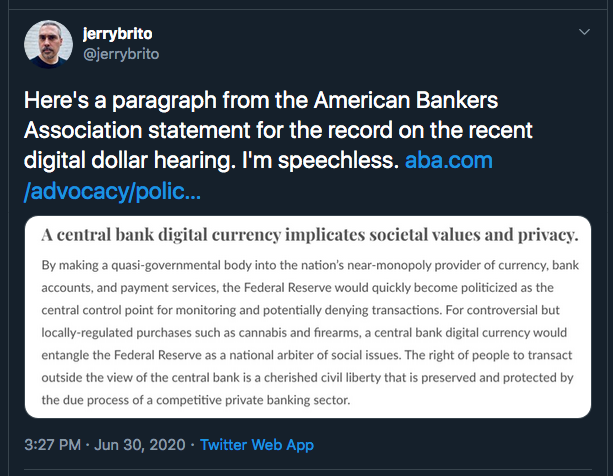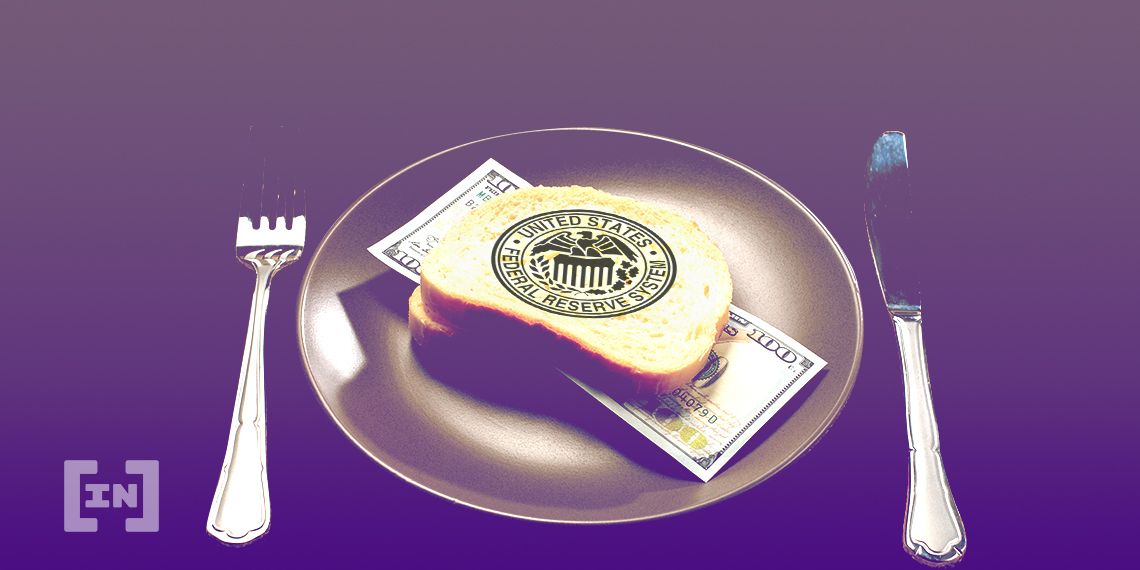The American Bankers Association (ABA) has issued a statement railing against the use of a digital dollar, a distributed ledger technology (DLT)-based payments system run by the U.S. Federal Reserve.
The association cites several tenuous arguments in its opposition against a Central Bank Digital Currency (CBDC). The American Bankers Association (ABA) issued a statement in early June that a hearing would take place to examine the potential actions the banking industry could take to mitigate the effects of the COVID-19 pandemic.
Titled “Inclusive Banking During a Pandemic: Using FedAccounts and Digital Tools to Improve Delivery of Stimulus Payments”, the ABA’s statement pushed back against blockchain solutions:

disruptive federalization of the banking system” would endanger “monetary policy, financial stability, credit availability, and financial inclusion.
The ABA Claims Fast, Electronic Payments are Already a Reality
The ABA goes on to defend the efforts of the private banking industry, which it says has been pivotal in the handling of economic impact payments and the paycheck protection program. However, several posts on social media show that citizens have only received a single payment in the past few months, if anything at all. The association cites credit and debit cards, and payment applications like Venmo as proof of the prevalence of digital payments. It adds:Given the significant investments in digital payments and the strong progress that has been made, there is little role for a digital dollarThe ABA claims that these options perform the functions of a would-be digital dollar.
Strongly Opposes a Digital Dollar Project
According to the ABA, the Federal Reserve is not positioned to be a retail bank. It argues that the proposal for FedAccounts and a digital dollar would undermine the efforts of retail bankers, result in unintended consequences, and lead to financial instability. It unabashedly states that:the right of people to transact outside the view of the central bank is a cherished civil libertyIt goes on to claim that the Federal Reserve would quickly become the central control point for allowing and censoring transactions. Indeed, private banks are already guilty of this and often execute at a whim incorrectly.
 Christopher Giancarlo, the former Chairman of the Commodity Futures Trading Commission (CFTC), is leading the Digital Dollar project. The Foundation will collaborate with Accenture in examining a U.S. Central Bank Digital Currency (CBDC).
In March, politicians announced that they would consider using a digital dollar for COVID-19 payments. If passed, the legislation would order banks and other financial institutions to provide digital wallets.
Such a move could deliver blockchain-based payments to millions of Americans and result in considerable industry adoption. The prospect has likely compelled the ABA to react.
Federal Reserve governor Lael Brainard in February 2020 revealed that the central bank was examining the potential of CBDCs. Few details have, however, been made public since.
Christopher Giancarlo, the former Chairman of the Commodity Futures Trading Commission (CFTC), is leading the Digital Dollar project. The Foundation will collaborate with Accenture in examining a U.S. Central Bank Digital Currency (CBDC).
In March, politicians announced that they would consider using a digital dollar for COVID-19 payments. If passed, the legislation would order banks and other financial institutions to provide digital wallets.
Such a move could deliver blockchain-based payments to millions of Americans and result in considerable industry adoption. The prospect has likely compelled the ABA to react.
Federal Reserve governor Lael Brainard in February 2020 revealed that the central bank was examining the potential of CBDCs. Few details have, however, been made public since.
Disclaimer
In adherence to the Trust Project guidelines, BeInCrypto is committed to unbiased, transparent reporting. This news article aims to provide accurate, timely information. However, readers are advised to verify facts independently and consult with a professional before making any decisions based on this content. Please note that our Terms and Conditions, Privacy Policy, and Disclaimers have been updated.

Rahul Nambiampurath
Rahul Nambiampurath's cryptocurrency journey first began in 2014 when he stumbled upon Satoshi's Bitcoin whitepaper. With a bachelor's degree in Commerce and an MBA in Finance from Sikkim Manipal University, he was among the few that first recognized the sheer untapped potential of decentralized technologies. Since then, he has helped DeFi platforms like Balancer and Sidus Heroes — a web3 metaverse — as well as CEXs like Bitso (Mexico's biggest) and Overbit to reach new heights with his...
Rahul Nambiampurath's cryptocurrency journey first began in 2014 when he stumbled upon Satoshi's Bitcoin whitepaper. With a bachelor's degree in Commerce and an MBA in Finance from Sikkim Manipal University, he was among the few that first recognized the sheer untapped potential of decentralized technologies. Since then, he has helped DeFi platforms like Balancer and Sidus Heroes — a web3 metaverse — as well as CEXs like Bitso (Mexico's biggest) and Overbit to reach new heights with his...
READ FULL BIO
Sponsored
Sponsored
